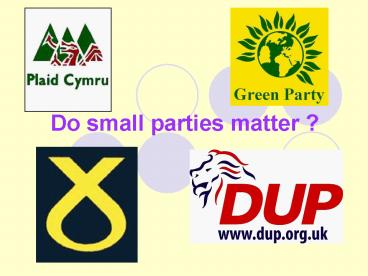Do small parties matter PowerPoint PPT Presentation
1 / 20
Title: Do small parties matter
1
Do small parties matter ?
2
Breaking the mould
- Political commentators often use the expression
breaking the mould of British politics to
describe the possible breakthrough of a new
party. - The mould refers to the traditional two party
system or duopoly.
3
How many small parties can you name ?
- Ulster Unionist Party (UUP)
- Democratic Unionist Party (DUP)
- Sinn Fein
- Plaid Cymru (Welsh Nationalists)
- Scottish National Party (SNP)
- Green Party
- British National Party (BNP)
- UK Independence Party (UKIP)
- Social and Democratic Liberal Party (SDLP)
4
Choose one party to research.
5
Do small parties matter ?
- The voting system works against small parties and
favours Labour and Conservative. - How can small parties make a difference ?
6
Do small parties matter ?
- Most small parties find it easier to win seats in
local councils rather than Westminster. - They can highlight issues ignored by other
parties. - Small parties only have importance in the
Westminster parliament when the government has no
majority or only a small majority. This is called
a hung parliament.
7
1992-1997 small parties do matter !
- John Major won the 1992 election with a small
majority of just 32. - This was reduced over time by deaths / retirement
of MPs and by-elections. - By mid1990s Major had no working majority
(reliable vote). - He had to rely on the votes of the 10 UUP MPs to
get government legislation (laws) passed. - This is not quite a coalition government but the
government must listen to the wishes of that
small party. - In the 1970s Labours majority relied on the
Liberals support (The Lib-Lab Pact)
8
Some parliamentary arithmetic
- There are 650 seats at Westminster
- 326 would give one party the majority.
- Form a government with a working majority from
these election results - Labour 297
- Conservative 294
- Lib Dems 28
- UUP 11
- DUP 7
- Plaid Cymru 3
- SNP 10
9
Two party system ?
- Does Item A (page 148) prove Britain has a two
party system in the Westminster parliament ? - Look at items C-F (pages 149-150)
- Does the same two party system apply in local
government and Welsh, Scottish and Northern Irish
government ?
10
Answers.
- Item A suggests that since WW2 Westminster has
been dominated by a two party system (duopoly)
of Labour and Conservatives. - A monopoly is where one person or group has
sole control / ownership. A duopoly is where
control is split between two.
11
Answers
- Items C-F suggest that local, Scottish , Welsh
and NI government has more competition between
several parties. Item C reveals that over 30 of
local councils were under no overall control
(NOC). - Items D and E shows that the Scottish Parliament
and Welsh Assembly are dominated by Labour but
the other parties (Con, SNP, Plaid Cymru and Lib
Dem) are roughly equal. - Item F shows that the Northern Ireland Assembly
is split between at least four main parties. - The Scottish Parliament, Welsh and NI assemblies
all use a Proportional Representation system of
voting. - The two party model really only applies at
Westminster.
12
Classifying party systems
- Read section 8.5 (page 145)
- Which description best fits the British political
system ? Justify why you have rejected the
others.
13
Sometimes a small party can win a seat at
Westminster because they have a famous / high
profile leader like former Labour MP George
Galloway or Robert Kilroy Silk
14
Party funding
- Where do political parties in the UK receive
funding from ? What rules exist to regulate this
? - Is our system open to bribery / corruption ?
- Should political parties in the UK receive state
funding (as in some European countries like
Germany where parties receive funding in
proportion to votes won) ?
15
Party funding
- Political parties in Britain are funded from
their members and from their sponsors and donors. - All parties accept donors from private businesses
and companies. - Following numerous scandals in the 1990s and
2000s rules exist concerning donations they
must be declared.
16
A design flaw in our democracy ?
- What is the strategy used by Ashcroft to fund the
Conservative Party ? - Target the marginal seats (swing seats) that can
be won with generous funding. - Can you quantify the influence of someone like
Ashcroft ? - Not really, but it acts as a powerful
consideration when deciding party policy. - How can their influence be eliminated from
politics ? - Adopt a voting system that does not rely on
winning marginal or swing seats.
17
Swing or marginal seats
- http//news.bbc.co.uk/1/shared/vote2005/flash_map/
html/map05.stm
18
Party membership
- Suggest reasons why party membership across the
UK is declining for all political parties. (see
Item A page 143) - What does Item B (page 144) reveal about the
relative popularity of parties versus pressure
groups ? Why do you think this is ?
19
Membership
- Party membership could be declining for a variety
of reasons - Disillusionment
- Lack of control by ordinary party members
- Competition from other leisure activities
- Lack of interest from younger age groups
- Lack of difference between the three main parties
crowding in the centre ground.
20
Membership
- Item B suggest that whilst party membership is
declining pressure group has increased in recent
years - Rise of single-issue politics
- Direct action groups seen as more effective and
able to influence politics - Spread of the internet, online forums, blogs etc
encourages the growth of small pressure groups.

